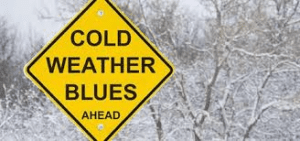Given where we live and the long, cold, dark winters we have a lot of people struggle with Seasonal Affective Disorder. Here’s some help from our Registered Social Worker Katarina Schmidt.
Seasonal Affective Disorder (SAD) – Part 1
Do you notice your mood, energy and general outlook change as the seasons change? Have you noticed these changes occur when we say goodbye to summer, and say hello to fall? Maybe the shift of having less daylight hours really seems to put a damper on things, and maybe it has you questioning what could be going on.
It could be beneficial to know that you’re not alone. Second, there may be a name for what you’re experiencing. Let me introduce you to Seasonal Affective Disorder (SAD).
What is Seasonal Affective Disorder (SAD)?
SAD is described to be a condition with reoccurring depressive episodes that start in fall/winter, and appear to go into remission during spring/summer (Rosenthal et al., 1984). In other words, you may experience low mood and other changes that appear to begin in the fall and winter months, and then notice the low mood and other changes leave during the spring and summer months.
What are possible symptoms of SAD?
- Low mood
- Lack of drive or passion
- Reduced interest in things you once found interesting
- Decreased concentration
- Increased sleep
- Increased intake of higher carbohydrate foods
- Weight gain
- Lack of energy
- Lack of pleasure
This is not intended to be diagnostic, but rather to provide information that may help to explain what you could be experiencing. Know that you are not alone, and now you may have language to describe what you are going through.
I hope this was helpful and stay tuned for tips and tricks on how to cope with SAD.
Resource: Fonte, A., & Coutinho, B. (2021). Seasonal sensitivity and psychiatric morbidity: Study about seasonal affective disorder. BMC psychiatry, 21(1), 1-7.
- Katarina Schmidt MSW, RSW
Thanks, Kat! A lot of people struggle with this and I’m sure they’ll find your info helpful.
Kat has her Masters degree and is a Registered Social Worker. She specializes in the following areas:
– Stress
– Anxiety
– Panic Attacks
– Depression
– Grief
– Self Confidence
– Self Esteem
– Self Compassion
– Complex Trauma
– Bipolar Disorder
– ADHD (Attention-Deficit / Hyperactivity Disorder)
– ASD (Autism Spectrum Disorder)
– FASD (Fetal alcohol spectrum disorders)
– Mental Health Issues
– Communication Issues
– And More!
Kat offers Individual sessions for Adults.
Book your appointment with KAT here.
Cheers to heading off the cold weather blues.
Penney

